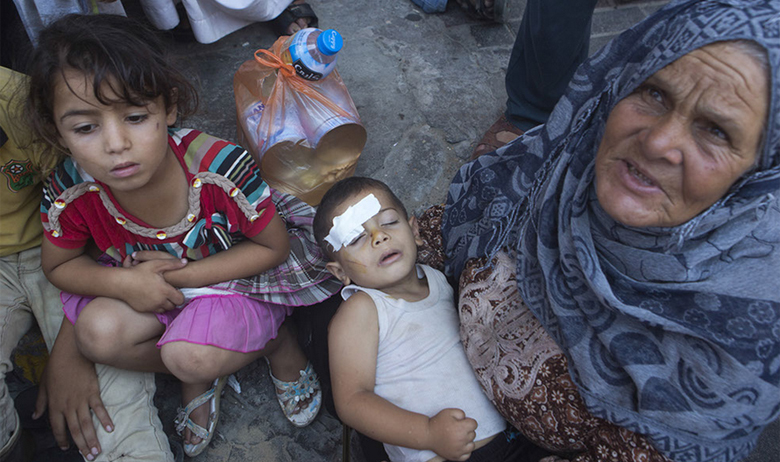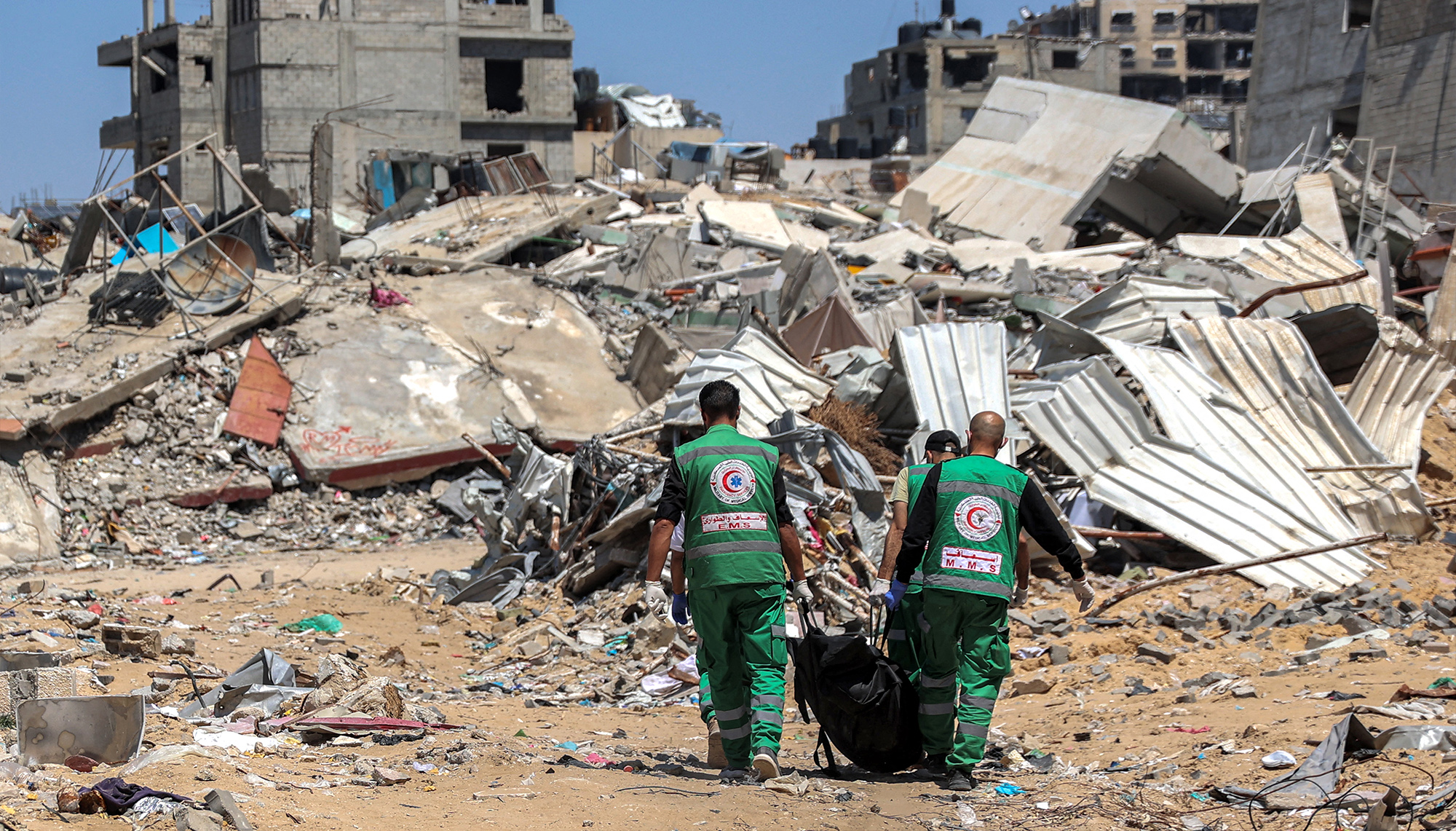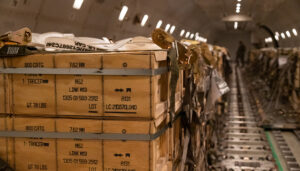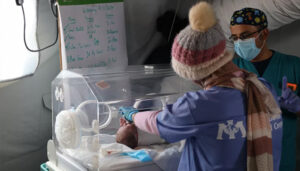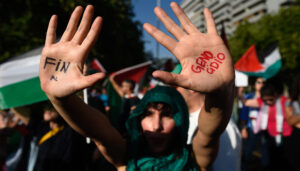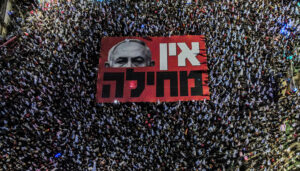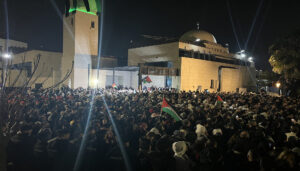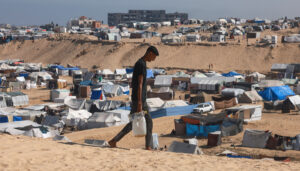(A surviver’s testimonial from the town Khuza’a east of Khan Younis, which was attacked by Israeli aerial strikes and tank shelling, resulting in a massacre the extent of it is not entirely clear yet).
We were three thousand people who decided, individually, to ignore all the threats and evacuation orders and to stay in our homes. There’s nothing heroic about it. It’s just that some of us would have had a nervous breakdown if they slept anywhere other than their beds, while others were too lazy to evacuate. Then there were those, like me, who couldn’t in their darkest imaginations foresee the scenario that awaited them a few hours later.
The first raid cut off the road connecting Khuza’a with Khan Younis. The second hit the power generators. The third hit the cellular towers, and the fourth telephone landline cables. We’re alone, the night in Khuza’a is pitch black, and the strikes are continuous. The air force bites everything. Window glass shatters. Shrapnel flies through your home and everything around you. You seek cover in a place you presume is less dangerous and you take a position you think will protect you. You count the strikes and the possibilities: Is this the sound of a missile on its way to us? Is this shell in our house? Why didn’t it explode yet? Did it target that house? That mosque? This is an F16 strike, this is artillery shelling. The entire night you’re just trying to preserve your sanity and what’s left of your nerves.
الكثير من شهداء خزاعة كانوا أصيبوا ونزفوا حتى الموت في انتظار اسعافهم. راقبت من شباك غرفتي ولساعات كل مراحل موت فتى في العشرين من عمره.
— Mahmoud Ismail (@Ibn3arbi) July 24, 2014
(Many martyrs of Khuza’a were hit and bled to death while waiting for ambulances. For hours, I watched from my window all the stages of a 20-year-old man’s death.)
In the morning they said: get out, the Red Cross is at the town entrance and will facilitate your exit. The army does not want to hurt you. This operation is targeting your homes and streets and lands and every aspect of your lives, but your life itself is not a target. We got out with the three thousand people. We walked in a solemn procession, like the residents of Shaja’iya walked a few days before, and like our grandparents walked 66 years ago. We walk and our eyes examine with shock and bewilderment the massive destruction caused by one night of shelling. We walk as though we bid farewell to all that’s left. Non of this matters, you freeze your emotions and focus on your feet. You arrive to where they said you should go. You find a line of tanks and nothing else. You barely sense the trap when bullets begin roaring everywhere.
Then what? Fire, screams, confusion, and arguments.
We were three thousand, we became 50 people. We gathered in one house. Half of us don’t belong there but it doesn’t matter. We were distributed between three rooms so that we don’t all die together if the moment comes. (Yes, you manipulate your brain in moments like this and convince it that an old wall separating two rooms can minimise the losses caused by a missile taller than the tallest of us and heavier than all of us combined).
In the room there were two old men aggravating my psychological crisis: one of them was comparing the different wars he’d experienced in his lifetime, and the other was persistently asking for a sip of water before the dawn call to prayer and beginning of the fast, forgetting for the thousandth time that there isn’t a drop of water left after the army targeted water tanks.
Children do what children are supposed to do in life: cry out of fear, cry out of boredom, cry out of thirst. They just cry. Others, myself included, listen to bits of the old men’s conversation in silence and boredom while looking out the window and the clock awaiting morning. (It seems there’s a myth, I don’t know where it comes from, that the chance of dying becomes smaller and the shelling becomes less intense with the first ray of sunshine. But, like all myths, it’s not obliged to meet your expectations and your projections).
Daylight broke, and the first missile hit the house’s stairway. What’s worse than the sound of an explosion? The silence after the explosion. Or what your ears betray you with, making you think it’s silence. Everything is shattered. Grey is all you see. Moments later your hearing returns and the dust settles. Fear turns to corpses and the color red breaks up the grey. Your mother and brother? They’re still alive. You get up on your feet. After 16 hours of stillness their main task is running. You run away from the place. The second missile hits. Shrapnel whistle by your ears. You make sure you’re ok. You run home. Minutes later your home is hit. You run again. People around you are running in all directions. A chopper flying above marks the only way out with its shots. You run. You run like your life depends on it, because your life really depends on it. You run over those who fell, you run next to the dead bodies, with one eye on the destruction and the road filled with hole, and the other on your family that’s melting in the running stream of people.
أمام عيني سقط طفل صغير كانت تحمله أمه بيد وباليد الثانية ترفع راية بيضاء. ابنها مات. استخدمت الراية ككفن وأكملت طريقها مع باقي أطفالها. رعب. — Mahmoud Ismail (@Ibn3arbi) July 24, 2014
(In front of me a small child fell from his mother. She was carrying him with one hand and a white flag with other. Her son died. She used the white flag to wrap him and she continued walking with the rest of her kids. Horror.)
ابن عمّتي استشهد أثناء محاولته إنقاذه أخيه المصاب والملقى في الشارع. الاثنين استشهدوا فوق بعضهم.
— Mahmoud Ismail (@Ibn3arbi) July 24, 2014
(My cousin was killed while trying to rescue his wounded brother who was lying on the street. The two of them died on top of each other.)
I left Khuza’a with my family and many other families. How? We got lucky. Why? I have no idea. What matters is that there are people still stuck there, and there are corpses on the streets and under the rubble until this moment. How many? It could be 20, 50, 100… no one knows with any certainty, and that’s the only thing that is certain. The only image out of Khuza’a until now is a glimpse, coming from the Israeli army, and showing scenes of destruction that break your heart and fill your chest with anger and hatred and tell you that the quiet days of this small town and its kind people will not return soon… perhaps ever.
